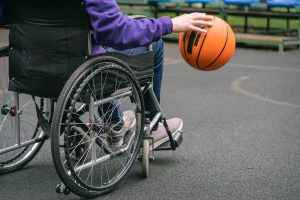When living with a disability often people assume that you can’t do many things in life, like drive a car or cook in the kitchen. However, as everyone who does live with a disability knows – life simply goes on – with the help of the right adaptations. Managing disability in the kitchen doesn’t have to be hard or difficult.
The kitchen is one of the most used rooms in one’s house and just because you have a disability doesn’t mean you can cook up a feast fit for a king. Manoeuvring around the kitchen, cutting up vegetables and meat and cooking something on the stovetop is more than possible with the help of some simple additions and adaptations to your cooking space.
We sat down with our Co-Founder Daniel, a highly qualified and trained chef with over 15 years working in some of Sydney’s most delicious seafood restaurants on how he manages to continue his passion in his home cooking.
Q – Daniel, do you find it difficult cooking in your home?
At first I found cooking at home difficult but cooking was my passion pre injury so I made it my mission to be independent in the kitchen and adapted things to suit me, such as chopping boards on my lap with a lip to stop ingredients falling off. Adapting a fork to hold things down while cutting was another great hack that still works to this day.
Q – What kind of dishes are your favourite to make?
I love my seafood and pasta so if a dish involves either of these I’m a happy person. Although my favourite dish would be a king fish ceviche. Nice, simple and fresh.
Q – Are there any special modifications or assistive tools you use that you can recommend when cooking in the kitchen?
I had electric kitchen benches installed at first which allowed me to bring them down to my wheelchair height but they could move for an able bodied person to use comfortably also.
As far as tools I’ve adapted there aren’t many I’ve actually added things too to make it easier, I use a standard fork to hold things down with my wrist and tenodesis grasp. A chopping board with a lip, and induction cooking top to prevent any burns as there is no naked flame.
Q – Most people assume those living with a physical disability might not be able use knives or sharp tools or cook using pots and pans – can you explain to the community your journey in learning to adapt to continue your passion?
I started off having my wife cut most things and assisted me in using a standard kitchen chef knife. I took my time with it and practiced my hand therapy to be able to hold a non adaptive knife well enough to cut anything now. The key is to have a sharp knife though it makes cutting and chopping a lit easier. If i’m using a pot or pan i always have a chopping board on my lap this prevents burns and spilling things in my lap but also makes it easier to stir, mix, flip anything in the pan/pot and then transfer back to the stove to keep cooking. My pots and pans have a standard handle for gripping and also a smaller handle i can use with my weaker arm to lift it from my lap to stove and lap again.
Q- How has the NDIS helped you continue cooking in the kitchen?
The NDIS has helped me get back into the kitchen with assistance in funding to purchase bench tops that can be moved up and down by the press of the button but also funding to have a social support come in and help when needed.
Q – Lastly, what’s your BEST cooking tip for all home cooks out there?
My best cooking tip would have to be Have a go and be creative, it can be so much fun being in the kitchen and creating dishes out of everything and anything. There was a tv show years ago called “Ready Steady Cook” with the concept of making several dishes out of not many ingredients. I love doing this with what’s in the fridge or pantry, less is more.
There is certainly a long way to go in terms of universal adaptations for kitchen appliances and tools, and representation of disability within the culinary world. But cooking is one of life’s greatest joys and there is nothing like a home cooked meal!
If you want to learn, or continue your passion with cooking or just want some tips and tricks in the kitchen you can find support professionals who can help.
We also recommended talking to your Plan Manager or LAC about what kind of assistive technologies you can claim in your funding to help your culinary passion. You can find your LAC contact at the official NDIS website.
To find the a Support Professional who loves baking, cooking, frying or barbecuing as much as you head to app.tappon.co/discover. Learn more about tappON here.



